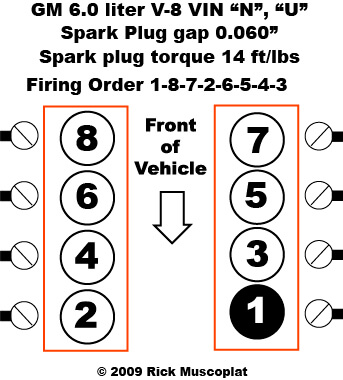6.0 Firing Order VIN N, U
6.0 Firing Order VIN N, U
This post shows the 6.0 Firing Order VIN N, U firing order.
The GM 6.0 Vortec engine with VIN code N was produced from 2002-2007 and has a maximum power output of 345 horsepower and 380 lb-ft of torque. It has a cast-iron block and aluminum heads with a cathedral port design. The bore and stroke of the engine are 4.00 inches and 3.62 inches, respectively. The engine is part of the first generation of 6.0 Vortec engines, which had just two engine codes, the LQ4 and LQ9 4. The LQ9 is a high-performance version of the LQ4, with an extra 15-45 horsepower and 10-20 lb-ft of torque 4.
The 6.0 L GM Vortec V8 engine debuted in 1999 on the Chevrolet Silverado and GMC Sierra pickup trucks. Known within GM as the LQ4, this large displacement V8 was the first generation of Vortec truck engines to feature an aluminum cylinder head. It displaced 6.0 liters or 366 cubic inches, with a 4.37 inch bore and 3.62 inch stroke.
Between 1999 and 2007, the 6.0 engine was used in many GM truck and SUV applications including Chevy Tahoe/Suburban, Avalanche, SSR and TrailBlazer. GMC models included Yukon, Yukon XL, Envoy XL and Savana vans. Towing capacity ranged from 8,000 to 10,600 pounds depending on configuration.
The 6.0L Vortec offered good low-end torque and power for GM trucks, while improvements in design allowed it to last well over 200,000 miles in most cases. Maintenance like regular oil changes is key for longevity on these engines.
6.0 Firing Order VIN N, U

6.0 firing order
Most common problems with the GM 6.0L
• Water pump failure: Water pump failure is common after about 150,000 miles. If you have these symptoms replace the pump before it fails: overheating, coolant leaks, unusual noises, and steam emitting from the engine compartment.
• Throttle position sensor failure: The throttle position sensor (TPS) controls airflow into the engine. The TPS sensor is on the throttle body and has a high failure rate. If you encounter acceleration issues, reduced engine performance, rough idling, and check engine light with a TPS code, replace the sensor.
• Engine knock: Engine knocking is caused by a variety of factors, including low-quality fuel, carbon buildup, and worn-out engine components.
• Exhaust manifold leaks: Exhaust manifold leaks are caused by worn-out gaskets, cracked manifolds, and loose bolts.
• Active fuel management system failure: Active fuel management (AFM) is very common problem across all GM engines.
©, 2009 Rick Muscoplat
Posted on by Rick Muscoplat